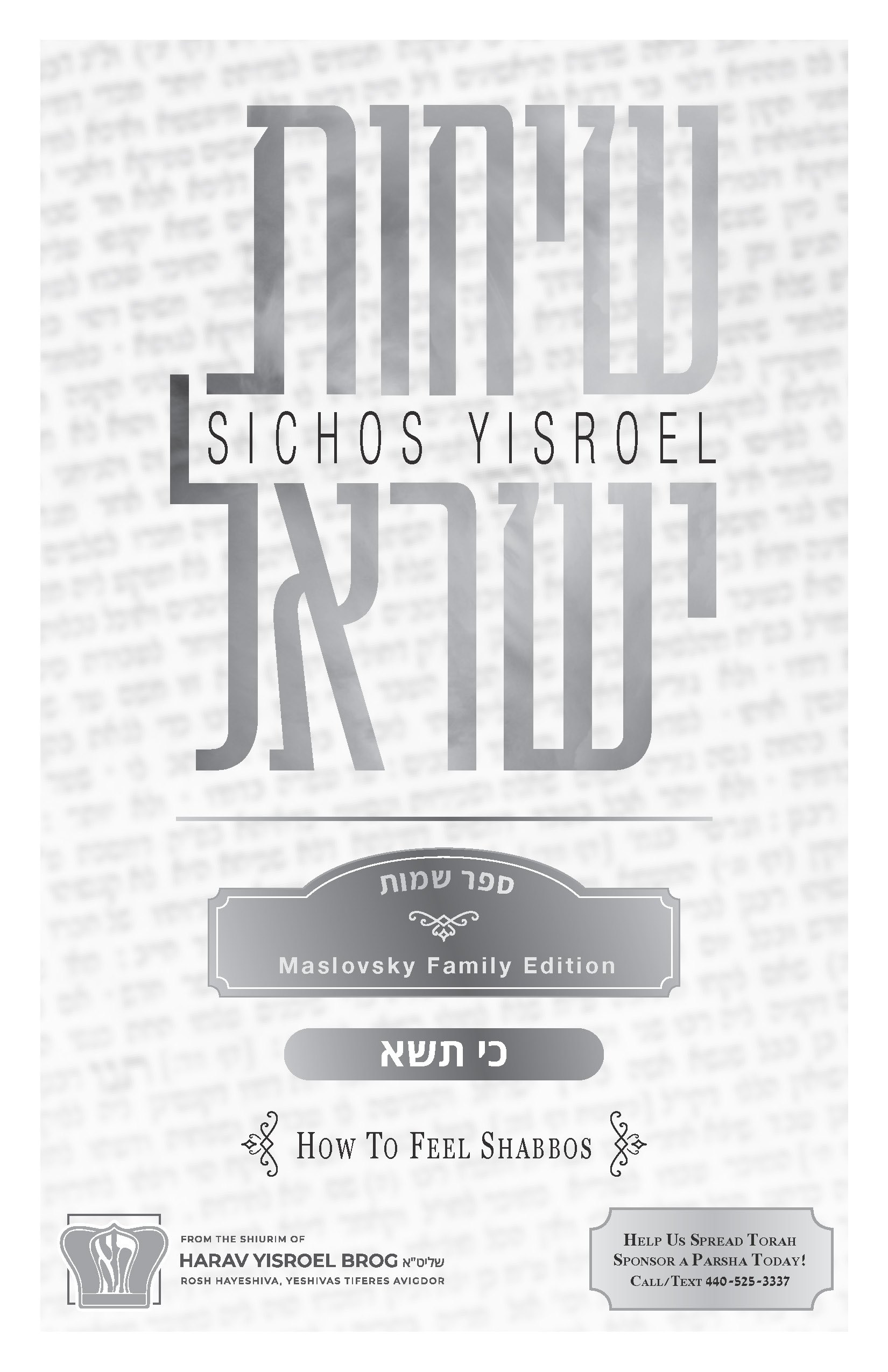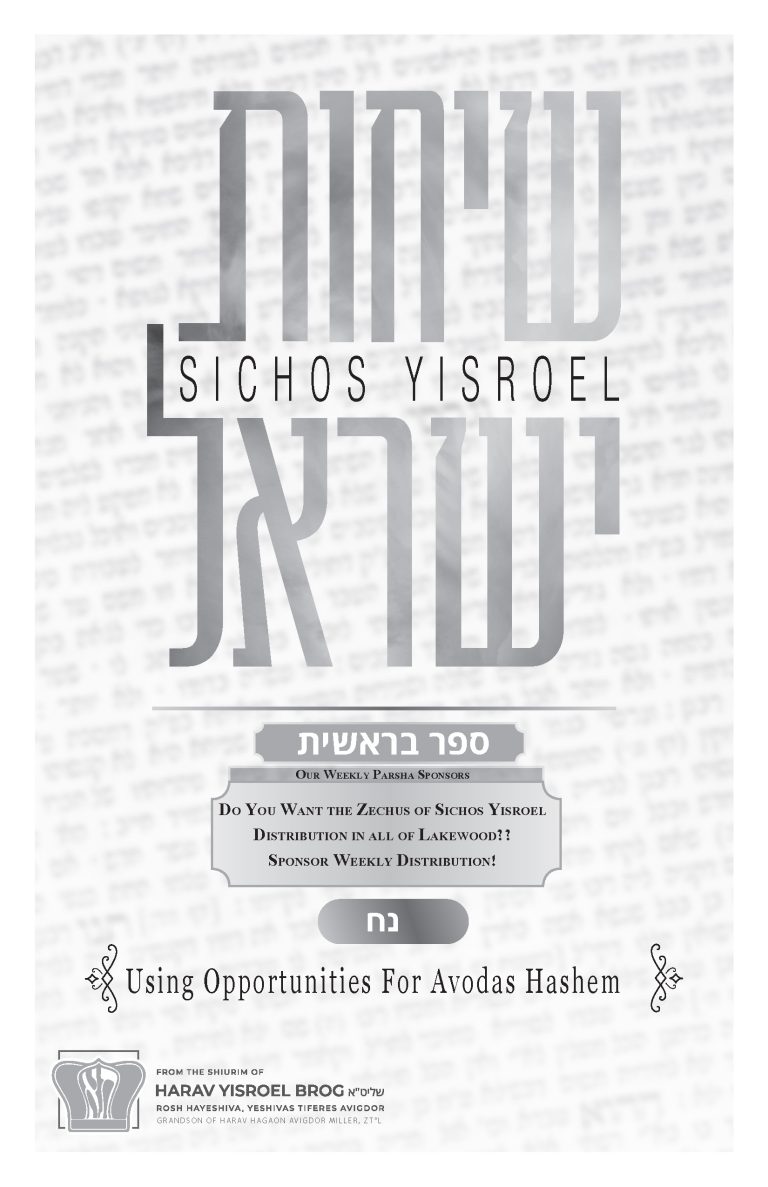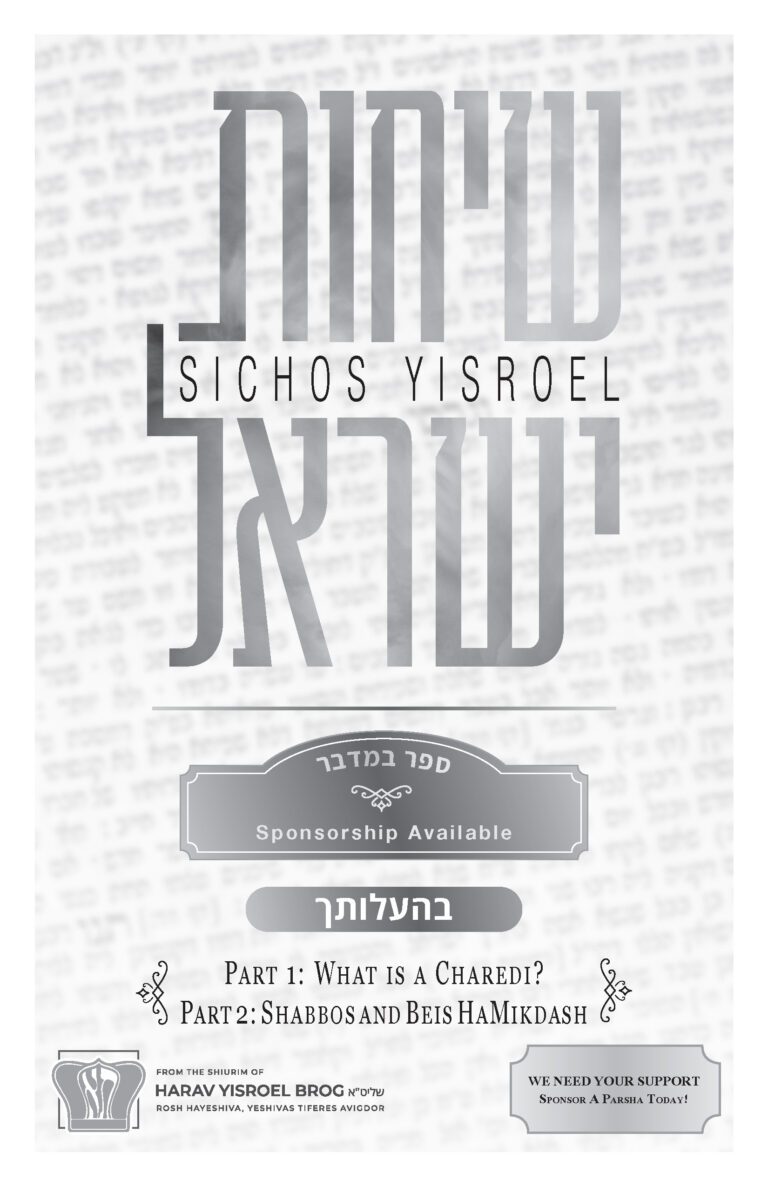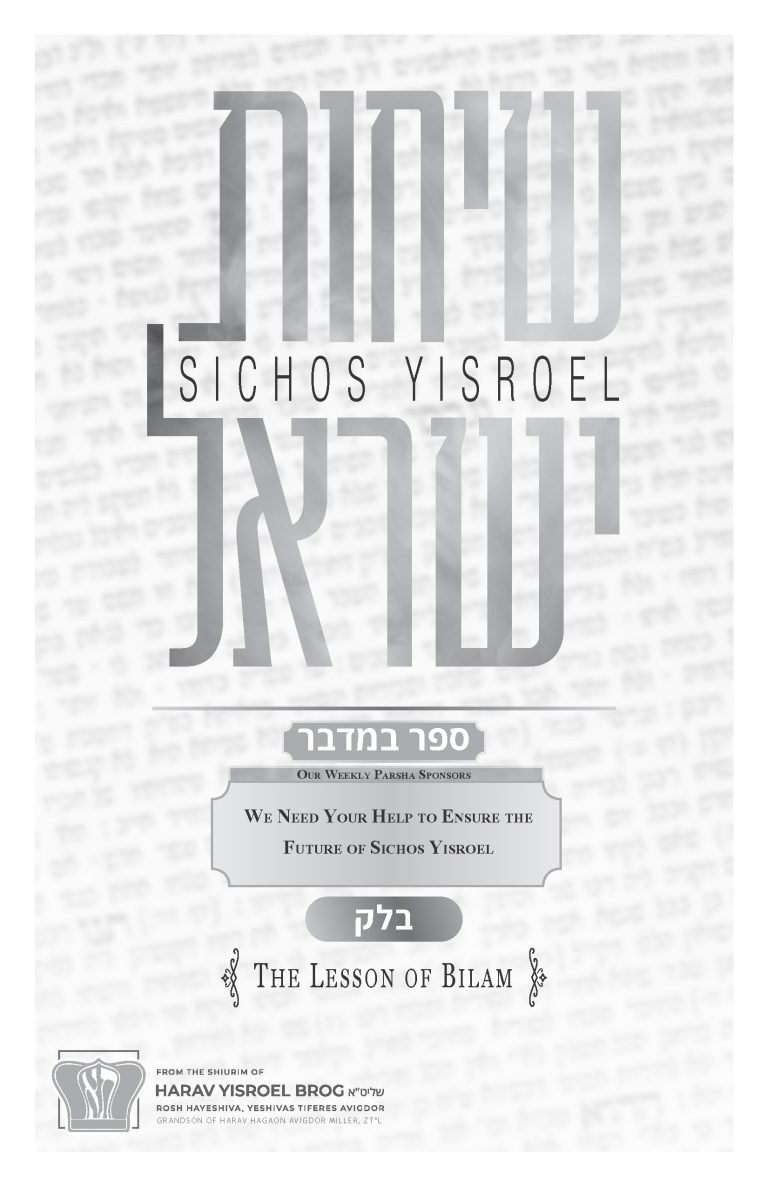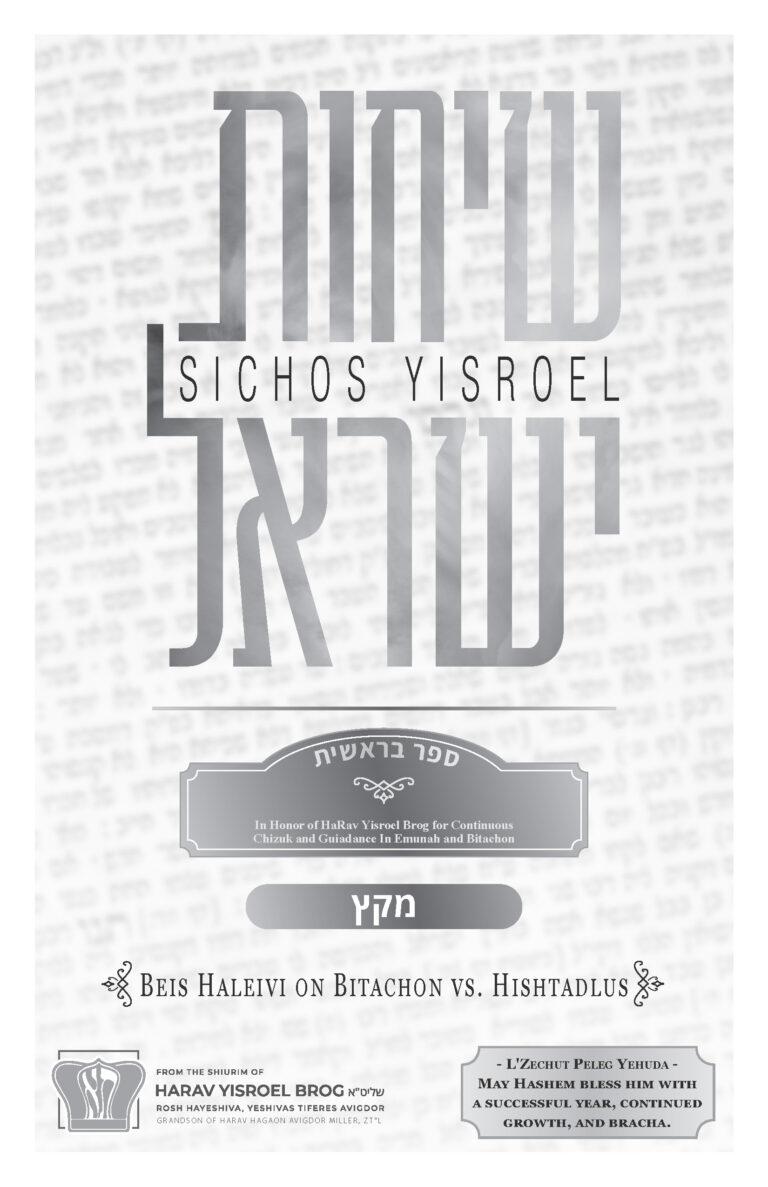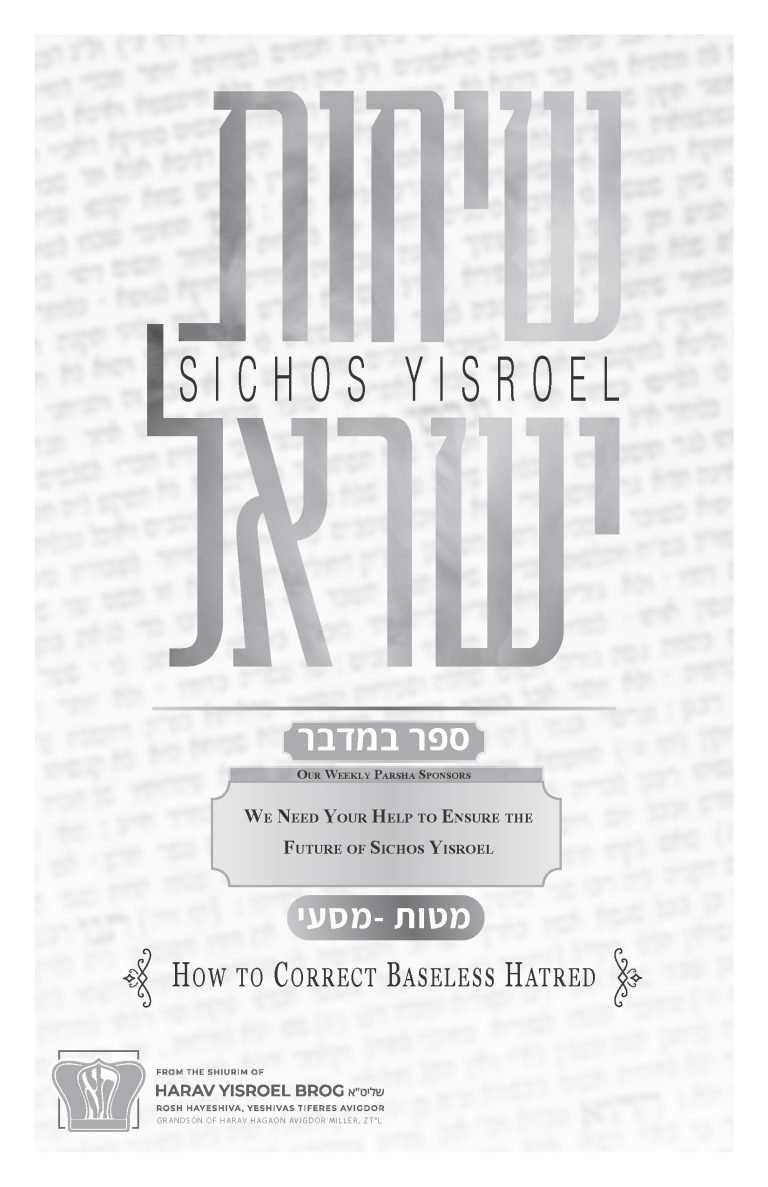Ki Sisa 5783: How To Feel Shabbos
Sponsored
לעילוי יצחק מאיר בן לב בלוי
Consider sponsoring a shiur
Visit YTATorah.org
Shiur presented in 5770
Enjoy Through the Guf, Remember and Praise
In this week’s Parsha, the Torah commands us regarding observance of Shabbos: ואתה דבר אל בני ישראל לאמר אך את שבתתי תשמרו כי אות הוא ביני וביניכם לדרתיכם לדעת כי אני ה’ מקדשכם – “Speak to the Bnei Yisroel and say, ‘You must keep My Shabbosos, for this is a sign between Me and you throughout the ages, that you may know that I sanctify you.” (Shemos 31:13)
Today, be’ezras Hashem, we will gain understanding in the uniqueness of keeping and, more importantly, of feeling the Shabbos. We previously saw the Radak (R’ Dovid Kimchi, 1160-1235) who writes that when the Torah says, וקראת לשבת עונג – “and you shall call Shabbos delight” (Yeshayah 58:13) it is referring to the body – it’s a mitzvas asei, לענג הגוף ביום השבת במאכלים ערבים וטובים – “to delight the body on Shabbos with delicious and fine food.” This is the meaning of וקראת לשבת עונג. If you are me’aneg your guf on Shabbos במאכלים ערבים וטובים, that will bring you to remember about Hashem’s greatness, and that He created the world, and rested on the seventh day. And the next step is, that you are going to be meshabei’ach HaKadosh Baruch Hu with your mouth. That is what the Radak says.[i]
What we want to understand over here is, first of all, why is it of such importance that the oneg of Shabbos comes about through the guf? Generally, the guf and involvement with the guf is a contradiction to being elevated and feeling an elevated nefesh. But here Hashem is telling us, on Shabbos I want you to start with the guf and I want you to come with the guf to your thoughts and then to the speech. Mah hapshat?
Hashem’s Gift of the Neshamah Yeseirah and Shalom
A little while ago, we spoke about the concept of neshamah yeseirah. We learned that the gift of the neshamah yeseirah is such that on Shabbos, the guf undergoes a metamorphosis. All week long, a person’s heart is split into two. There are “two” levavos. There is the yetzer hara and there is the yetzer tov. There is a milchamah nora’ah (an awesome war) going on between the two of them. But on Shabbos, HaKadosh Baruch Hu gives us an injection of a neshamah yeseirah. That additional neshamah (i.e. neshamah yeseirah) enables the guf to become subjected and subjugated to the neshamah.
We saw this from the Sokotchover, the Avnei Nezer, who said that what is an ol (yoke) to the guf during the weekday – to be mekabel malchus shamayim – is not an ol on Shabbos because on Shabbos there is a ceasefire. HaKadosh Baruch Hu gives us a ceasefire on Shabbos, and the ceasefire on Shabbos is such that there is menuchah. Menuchah means “rest” from the milchamah. There is shalom. On Shabbos there is peace between the guf and the nefesh. The guf is in harmony with the nefesh. That is what a person could achieve on Shabbos.
With this mitzvas asei, Hashem wants us to use our guf and experience the harmony between the guf and the nefesh, and realize that it’s shayach for the guf to get along with the nefesh. The struggle is such a deep struggle. The challenge that we fight all day long is so mighty that many great people have thought that this battle cannot be won, and that there is never going to be peace. We cannot imagine living a life of harmony and peace between the guf and the nefesh. But you should know that on Shabbos, HaKadosh Baruch Hu gives us a neshamah yeseirah and this potential for achieving harmony is a direct result of the neshamah yeseirah.
The truth is, it’s a Rashi. There is a moiradige Rashi (Beitzah 16a)[ii] which I showed before. But every time I look at it I see new gems in this Rashi. Rashi describes the neshamah yeseirah. He asks, what is the neshamah yeseirah? He says, רוחב לב למנוחה. HaKadosh Baruch Hu is marchiv, He broadens a person’s heart to experience the menuchah. What does that mean? All week long a person’s heart is tzukvetched, it’s pressured, it’s limited. You know why? The yetzer hara is on one side of the heart fighting against you. Every time you want to take a step in the right direction, he tries to convince you otherwise. But today you have רוחב לב למנוחה ולשמחה. Rashi continues: ויאכל וישתה, a person could eat and drink, ואין נפשו קצה עליו and his neshamah is not קצה עליו, the neshamah does not become disgusted by it.[iii] Generally, when a person say, “Okay, let’s sit down to a geshmake meal,” his neshamah is קצה עליו. You know why? Because generally when a person sits down to a good meal, what is the purpose of it? להנאתו (for his pleasure). A weekday fancy seudah is not generally a davar mitzvah. A weekday meal is a fancy meal during the weekday, and what happens is נפשו קצה עליו, your neshamah can’t stand it, because you are undermining the neshamah, you are weakening your neshamah. But on Shabbos, Rashi says, as a direct result of a neshamah yeseirah, ויאכל וישתה, when he will eat and drink, the neshamah is not קצה עליו – because today it is a mitzvah להתענג במאכלים טובים וערבים. Today it’s a mitzvah. But there is a tenai (condition). The tenai is that you have to be וקראת לשבת עונג. The challenge is present even on Shabbos. On Shabbos a person has a mitzvas asei to eat מאכלים טובים וערבים. And the question is, does he do it להנאת עצמו? On Shabbos there is an excuse to have a good, nice meal. Or does he do it because it is a mitzvas asei of Shabbos?
Eating for Shabbos or For the Body?
The whole nisayon of Shabbos is whether you are eating this meal because it is lehano’as atzmecha, for your personal pleasure, or you are eating it in order to fulfill a mitzvas asei, and to do the ratzon of your neshamah. If you are eating because today it is a mitzvas asei, that is the ratzon of your neshamah and that is why the neshamah is not קצה עליו even though it is מאכלים ערבים וטובים. And do you know what the result of this is? The passuk goes on to say as follows. If a person does this, אז then ‘תתענג על ה, “then you will delight in Hashem” (ibid. 58:14). You hear what it says over here? Moiradig! If a person is וקראת לשבת עונג and a person is me’aneg the Shabbos and he does not desecrate the Shabbos, ‘אז תתענג על ה.
Do you know what ‘תתענג על ה is? That is how the Mesillas Yesharim describes olam haba. Olam haba is a person being ‘מתענג על ה. In olam haba a person can sense the immense pleasure of being in the presence of Hashem. Here in this world, it’s hard for us to do it. We live in a gufniyus body, we live in a physical world, so we are attracted more to physical than spiritual things. But it says on Shabbos kodesh, a person could be ‘מתענג על ה. If you do וקראת לשבת עונג, you could come to this madreigah.
Shemiras Shabbos brings Spiritual Ta’anug
Now, the Radak (ibid. 58:14) brings down two explanations, one from himself and one from one of the gaonim, Rav Saadya Gaon.[iv] Both are moiradige pshatim. Let’s hear what he says. The Radak says, אם תתענג את השבת, if a person will be me’aneg the Shabbos, then, ‘תתענג על ה, which means that ישפיע לך טובות – Hashem will be mashpi’a upon you such tov עד שתתענג עליו, you will mamish be mes’aneg over the tov that Hashem gives you, ותודה בו and you are going to be modeh on Shabbos tremendous hoda’ah and you are going to understand כי מאתו הכל ומידו – “all is from Him alone.” If you keep Shabbos in the right way, if you take the physical pleasures of Shabbos and you are me’aneg the Shabbos because it is taka Shabbos and you do it leshem Shabbos, HaKadosh Baruch Hu is going to be mashpi’a upon you such good, and you are going to have a tremendous ta’anug (joy) knowing that everything is from Hashem. והתענג he says, ‘על ה, you know what that ta’anug is? תענוג הנפש, it is going to be a spiritual ta’anug. You are going to have such a spiritual ta’anug on Shabbos as a result of this, you are going to be connecting with Hashem big time. That is the Radak’s pshat.
Keeping Shabbos Like a Wise Person Brings Physical Pleasure
Then the Radak says, והגאון רב סעדיה פירש, Rav Saadya Gaon explains that תתענג על השם is referring to ta’anug haguf. You are going to experience a ta’anug haguf! Meaning, תענוג גופך, the physical ta’anug ‘יהיה על ה. It will be a physical pleasure על ה’ לא ככסילים, but not like the fools about whom it says, לא נאה לכסיל תענוג, for a fool ta’anug has no value; אבל המשכיל, but somebody who is smart will have a tremendous ta’anug haguf. Pashut his physical guf will feel a pleasure that is out of this world! Listen to what he says next: והמשכיל, the smart person, לא ירבה בתענוג יותר מדאי. You know what a guy might say, “Wow, this is really great. This cholent tastes amazing.” So the guy will now bury himself in cholent. He will bury himself in all kinds of foods.
But, Rav Saadya Gaon says, אבל המשכיל לא ירבה בתענוג יותר מדאי כי אם במשפט – “a wise person will not increase the ta’anug excessively, but he is going to do it with the right measure.” בעבור, you know why? Because he understands what Shabbos is about, כי הוא מתעסק בחכמה – “Shabbos is a day of being osek bechochmah. ובה יתענג יותר – you’re going to have more pleasure on Shabbos from chochmah. אלא but what is going to happen is שתענוגי הגוף במשפט if you do the ta’anugei haguf properly, ייטיבו שכלו, it’s going to make your seichel feel much better. ויחזקו כחותיו, it’s going to give you tremendous chizuk in your kochos. Which kochos?
Three Gifts from Shabbos
Rav Sadya Gaon says there are three kochos. Number one, כח הזכרונות, your memory. We all have shvache memories, right? We all can’t remember what happened yesterday unless it’s shtussim, but in Torah we can’t remember. You know what he says? If a person is me’aneg the Shabbos, then the person will come to a madreigah that his zikaron is will become better. That’s number one. Number two his כח הבחינה. That is a person’s koach to be mechalek chilukim, to discern things. You look at a Rashi, you look, you look, you look, and you say vos shtait duh. You have no idea. You don’t even know what you’re looking at. You’re looking at a Gemara, but you don’t know what you’re looking at. You look at a Tosafos, you don’t know what you’re looking at. What do you say? You say, “It’s all shver,” or, “It’s easy,” but either way you didn’t see it. The third koach, he says is the כח המחשבה. You will be able to hold a thought for more than five seconds. You will be able to think about something. So he tells us that the experience of Shabbos is an awesome experience. A person should seize this opportunity.
So when you eat tonight, say to yourself, “I am going to eat lekovod Shabbos. I am eating because Shabbos wants me to eat. My neshamah wants me to eat on Shabbos. My neshamah wants me to eat on Shabbos because Hashem wants me to eat on Shabbos.” What is going to happen is, I am going to think, “Wow, what a chessed of Hashem – such delicious food!” And I am going to remember that Hashem is the yotzer bereishis. And the next step is: “I am going to be meshabei’ach and mefo’er Hashem.” You are going to thank HaKadosh Baruch Hu for this. Then you are going to sense the ta’anugei haguf, the pleasure of the food. See if you could get a new pleasure from the food today. Or at the very least, you will get pleasure in your nefesh. When you sit down and learn afterwards, you will feel, “Ahhh.”
Why Do We Feel Sluggish On Shabbos?
But if a person tells me he feels sluggish on Shabbos, he eats his cholent, and he feels like he is finished, he knows one thing: He wasn’t me’aneg the Shabbos, he was me’aneg es atzmo. He missed the opportunity to give himself an experience of tremendous ta’anug hanefesh.
The emes is the Vilna Gaon on Yeshaya (1:13) discusses these things.[v] He says לענג השבת – there is a mitzvah to be me’aneg the Shabbos, במאכל ובמשתה with food and drink, ולכבדו בכסות נקיה and to honor it with with clean clothes. But, he stresses, ושיהיה כוונתו – do you know what his kavanah has to be? לשם שבת ולא להנאת עצמו. It has to be for the purpose of Shabbos and not for his own benefit, he says. He writes, that’s why the passuk says וקראת לשבת עונג. It doesn’t say וקראת “yourself” עונג on Shabbos. It says וקראת לשבת עונג, you have to be addressing the Shabbos. The oneg has to be because this is what Shabbos wants from you. לשבת דיקא it’s specifically for Shabbos. And as the Gemara (Shabbos 118a) says: כל המענג את השבת, if a person is me’aneg es haShabbos, they give him נחלה בלי מצרים, “inheritance without borders.” But it’s only if you are me’aneg the Shabbos. וכן סדרו לנו בתפלה, it says מענגיה לעולם כבוד ינחלו, davka those who are me’aneg the Shabbos. You have to do it for Shabbos.
And he says, what does it mean that I am doing it for Shabbos? הינו הנשמה יתרה. It means, for the neshamah yeseirah שזוכין לה המשמרים את השבת כדת, that those who are meshamer Shabbos properly merit to get a neshamah yeseirah. And when it says you eat lekovod Shabbos, you know what that means to say? I am responding to the ratzon of my neshamah yeseirah. My neshamah yeseirah wants me to be me’aneg the guf. The Vilna Goan explains further, that is why when Chazal bring a ra’ayah of how great oneg Shabbos is, it is not because it says, וקראת לשבת עונג. They bring the passuk that says ‘אז תתענג על ה because that is the oneg of Shabbos. Meaning to say, that with the oneg of Shabbos, you could mamish experience a zei’ar anpin (in a small way), a me’ein olam haba. If a person goes for this, it is unbelievable, rabosai, what he can achieve on Shabbos.
A Neshamah Yeseirah to Be Mekadesh the Ta’avah
The Beis Halevi says that there are two types of mitzvos.[vi] There is one type that goes against a person’s natural tendencies. That is sheviras hata’avah, לא תתרו אחרי לבבכם ואחרי עיניכם, …והייתם קדשים לאלקיכם, שבירת התאווה והרחקה מהם – “breaking our lusts and distancing ourselves from them.” On Shabbos, on the other hand, the mitzvah is just the opposite: להתענג בתענוגים, we have to be misaneg beta’anugim (enjoy pleasures of Shabbos), דבשבת אין המצוה לשבור התאוה, on Shabbos, the mitzvah is not to break the ta’avah, רק לקדש התאוה ולתקנו ולהעלותו לקדושה – but rather to sanctify it, correct it, and elevate it to kedusha. But how could you do that? Lema’aseh we are beheimos, lema’aseh we are materialistic people, we are guf people! We want to eat because we like to eat. For that, Hashem gives you a neshamah yeseirah and HaKadosh Baruch Hu says, “Be mekadesh the ta’avah. Take your ta’avah, take your guf and eat. It doesn’t mean you can’t enjoy cholent, but the reason you are supposed to be eating it is because your neshamah wants you to eat it.
That’s why, when someone takes that second bowl or third bowl, and he starts to think, “I am going to be dead, uh oh,” the neshamah doesn’t want a person to do that. והמשכיל – if a person wants to use his seichel and he eats bemishpat – so it doesn’t knock him out or put him out.
This is what a mentch has to understand. To be zoche to this is not a davar pashut. But the passuk gives us a formula, so we should try it. I suggest you try it. I am telling you, you will be amazed and flabbergasted how things in your life that you have struggled with on Shabbos, will now become less of a struggle!
You will see the guf will subjugate itself to the neshamah. I know and understand that you can’t imagine it. It is unimaginable, until you try it. You have to try it to see. Everybody could experience it, rabbosai,to some degree.
Remember the Formula, And Daven
You know what it depends on? You have to follow the passuk in Yeshayah (ibid), וְדַבֵּר דָּבָר – don’t talk about things on Shabbos that you are not supposed to talk about. Don’t do things on Shabbos you are not supposed to do on Shabbos, מִמְּצוֹא חֶפְצְךָ – don’t look into your business affairs. Keep focused on the Shabbos. Try it. That’s the formula. The formula is firstly to do the physical pleasures because Shabbos wants you to lekovod Shabbos. That leads you secondly to remember Hashem, He is the Creator. Third thing is, you are meshabei’ach, you express that as you thank and praise Hashem.
Now after all that, you should know we daven for this, we plead with Hashem for this recognition every single Shabbos. The highest point of Shabbos is when? Minchah. Minchah is the highest point of Shabbos, that’s when we get olam habo’dig. We’ve been into the Shabbos experience for 24 hours and now we’re flying.
But, what often happens by Minchah is, you go into the shul and you see many guys don’t come with their ties – if they come at all. Their shirts are half untucked. They are shlepping a shtikel. Shabbos has been over a long time ago for them – when they took their nap, it was already ‘over.’
That’s why we are mischazek and daven for menuchah in Minchah. In Minchah, we say מנוחה שלמה שאתה רוצה בה, HaKadosh Baruch Hu, You gave us a מנוחה שלמה. Do you know what מנוחה שלמה שאתה רוצה בה means? What does that mean “a complete menuchah?” Complete menuchah means no milchamah. The guf should not struggle with the neshamah on Shabbos. Hashem wants there to be shalom. On Shabbos, peace has to reign. יכירו בניך – “Your children, your kinderlach, Hashem, should recognize this.” They should recognize this menuchah. וידעו and they should know. Knowledge means they should know klar, כי מאתך היא מנוחתם, they should have an experience of knowing that their menuchah is coming from You, Hashem. Let them have an experience of eating on Shabbos, and their neshamah be elevated. Not that their neshamah says: “Goodbye.” No, it means, to let them have an experience on Shabbos where they take something special and say, “Ah, baruch Hashem,” and they want to learn afterwards and they feel a hisromemus. That’s the whole point here. יכירו בניך וידעו כי מאתך היא מנוחתם. Because then a person is going to experience ‘אז תתענג על ה. Then, the passuk of ‘אז תתענג על ה is going to be niskayem. And you will also get a taste of olam haba in this world, rabbosai. I want you to taste olam haba a little bit in this world. Anybody that comes over to you and tells you, “Oh, I had lots of fun, I slept for six hours” – you should think, “What a tragedy!” That’s like telling me you just fell off a cliff and you were bumped around until you got to the bottom and only your hands and feet were broken but you are still alive. That’s not something I would do. A person who destroys himself and he doesn’t give himself a chance is missing out on the greatest of pleasures!
It’s Worth Trying to Taste Hashem’s Matanah
The Ramchal says hisangus al Hashem is the greatest pleasure and sense of ta’anug that is shayach in the whole world. And to feel this on a consistent basis and fully, he says, is only in olam haba. But Hashem says, “I am giving you such a matanah tovah. Kinderlach, I love you, I am giving you a Shabbos to feel this matanah tovah.”
So you have to aspire to it. Try it once, and test it out for yourself. Take one area that you struggle with on Shabbos. I know I had such an area on Shabbos. When I used to find waking up on Shabbos morning difficult. I used to force myself, but it was like climbing straight walls backwards. It lasted for a little bit. But I never realized it was shayach. Then I discovered this derech.
I said, “You know what, let me try this. It’s a problem. Do you know why? Each Friday night you are so tired, you go to sleep late, the whole week you didn’t sleep much and you eat a big meal Friday night. Why don’t you follow Hashem’s process? Instead of shmoozing about shtussim vehavalim, pull back, start to think about Shabbos, keep your eyes on Shabbos and let’s see if all of a sudden, miracles could happen.” And you know something? Miracles did happen. I could wake up on Shabbos morning. It got to the point where I couldn’t even imagine sleeping in bed at 7 o’clock in the morning. You can’t imagine it. I never thought it would be shayach. Then, 6 o’clock – I thought it’s not shayach. But it became the reality. And it’s not even a challenge. I’m telling you, rabbosai, you could do it. And then you can go a whole day. I remember thinking then, “You have to sleep the whole afternoon to make up for that.” But if you do that, then you undermine everything you invested in Shabbos. I didn’t think it was shayach. I mamish didn’t think it was shayach. I knew myself. For many many years, it was not shayach, but in the end I did it. A short nap, that’s all.
The emes is, it is shayach. I’m telling you, the guf wants to do what the neshamah wants it to do. It’s a pele, I’m telling you it’s a pele. Rabbosai, try to get a taste of this. You should all be zoche taka to really taste it. We are just tasting it with a little brekelach over here, shirayim it’s called. But this is the way to get a feeling, a sense of what Shabbos really is. You could mamish ‘fly’ on Shabbos, and enjoy that spiritual high in a way that is unimaginable! HaKadosh Baruch Hu should help us that we should have this consideration. We should chazer this, and we should be zoche to a gevaldige Shabbos.
The Bottom Line
Delighting the body with the delicious food that we enjoy on Shabbos, enables us to remember Hashem’s greatness and the act of Creation and then express our praise of Him with our mouths, as the Radak teaches us. However, the idea of the physical body working in concert with the spiritual neshamah for uplifting our thoughts and speech into a realm of spirituality, seems almost inconceivable. Of course, the secret for this counterintuitive coexistence is none other than the “injection” of the neshamah yeseirah. It is a gift from Hashem, that subjugates the natural whims of the body to the desires of our neshamah, by creating a “ceasefire” and subsequently, menuchah. The neshamah yeseirah also allows the positive mitzvah of וקראת לשבת עונג to build a temporary harmony between the body and soul on Shabbos. This enables us to experience a little of the olam haba’dig oneg, a ‘taste’ of ‘תתענג על ה. But for all of this to happen, a few important conditions need to be fulfilled. (1) We should be careful not to discuss forbidden topics on Shabbos – thus creating the fertile atmosphere where lofty ideas can take root. (2) Food should be eaten in moderation. (3) The eating itself should not be done for personal pleasure, but to fulfill the mitzvas asei of וקראת לשבת עונג – the ultimate ratzon of Hashem. This coming Shabbos, by trying to follow these steps to properly enjoy my food, I will be zoiche to feel some ענג and delight of being in the presence of Hashem. Im yirtzeh Hashem, this will be noticeable in the chizuk of having a clearer memory, a heightened power of discernment and an improved capacity for thought, as well as spiritual ענג from recognizing and praising all the tovos that Hashem bestows upon me and my family, including my food!
[i] וקראת לשבת עונג. אם תשיב משבת, מצות לא תעשה, וקראת לשבת עונג, מצות עשה לענג הגוף ביום השבת במאכלים ערבים וטובים שמתוך שישנהו משאר ימים לטוב יזכור מעשה בראשית ושהאל חדשו מאין ושבת ביום השביעי ומתוך כך ישבח לקל ויפארוהו בפיו ובלבבו, ותתענג נפשו בו, ופי’ וקראת כמו מקרא קדש
[ii] אמר רבי יוחנן משום רבי שמעון בן יוחי: כל מצות שנתן להם הקדוש ברוך הוא לישראל – נתן להם בפרהסיא, חוץ משבת שנתן להם בצנעא, שנאמר: ״ביני ובין בני ישראל אות היא לעולם״. אי הכי, לא לענשו גוים עלה? שבת – אודועי אודעינהו, מתן שכרה – לא אודעינהו. ואי בעית אימא: מתן שכרה נמי אודעינהו, נשמה יתירה – לא אודעינהו. דאמר רבי שמעון בן לקיש: נשמה יתירה נותן הקדוש ברוך הוא באדם ערב שבת, ולמוצאי שבת נוטלין אותה הימנו, שנאמר: ״שבת וינפש״, כיון ששבת ווי אבדה נפש. (רש”י ד”ה נשמה יתירה – רוחב לב למנוחה ולשמחה ולהיות פתוח לרוחה ויאכל וישתה ואין נפשו קצה עליו)
[iii] את הכלל הזה אנו למדים מיום השבת. חז״ל אמרו: ״לא ניתנו שבתות וימים טובים אלא לאכילה ושתיה ועל ידי זה שהפה מסריח התירו לו לעסוק בהם בדברי תורה״ (ירושלמי שבת טו:ג), כלומר שמתוך אכילה ושתיה יכולים להגיע לעונג הרוחני ולקדושה העילאה של שבת יותר מאשר תוך לימוד תורה. ולא עוד אלא שראו בלימוד תורה בשבת המביא לידי מניעת העונג של אכילה ושתיה – חילול קדושתה (ראה שבת קיט; וראה לעיל במאמר ״עונג שבת״). וכן הסביר רש״י, שהנשמה היתרה שהקדוש ברוך הוא נותן באדם בערב שבת (ביצה טז) – מהותה היא: ״רוחב לב למנוחה ולשמחה ולהיות פתוח לרווחה ויאכל וישתה ואין נפשו קצה עליו״ (שם), כלומר, שהנשמה היתרה שואפת עונג וקדושה מתוך ריבוי אכילה ושתיה שהיא אינה קצה בהן, ודוקא מתוך זה מגיע האדם למדריגות הרוחניות שעליו להשיג ביום השבת (ס’ אור הצפון ,שמות, גשם ורוח)
[iv] אז תתענג על ה’. אם תתענג את השבת תתענג על ה’ כלומר ישפיע לך טובות עד שתתענג עליו ותודה בו ובטובו כי מאתו הכל ובידו, והתענוג על ה’ הוא תענוג הנפש, והגאון רב סעדיה פירש תענוג הגוף כלומר תענוג גופך יהיה על ה’ לא ככסילים שנאמר בהם לא נאה לכסיל תענוג אבל המשכיל לא ירבה בתענוג יותר מדאי כי אם במשפט בעבור כי הוא מתעסק בחכמה ובה יתענג יותר אלא שתענוגי הגוף במשפט ייטיבו שכלו ויחזקו כחותיו השלשה והם כח הזכרונות וכח הבחינה וכח המחשבה.
[v] ז”ל: לענג את השבת במאכל ומשתה ולכבדו בכסות נקייה, ושיהיה כוונתו לשם שבת ולא להנאת עצמו, על זה אמר (ישעיה נח, יג) “וקראת לשבת עונג” לשבת דייקא. וכן אמר (שבת קיח,א) “וכל המענג את השבת”. וכן סדרו לנו בתפילה “מענגיה לעולם כבוד ינחלו”, מענגיה דייקא, היינו הנשמה היתירה שזוכין לה המשמרין את השבת כדת. ולכן כשאמרו חז”ל (שם) כל המענג את השבת (נותנין לו נחלה בלי מצרים) הביאו ראיה מהכתוב (ישעיה נח, יד) “אז תתענג על השם”. ועל פי זה נוכל להבין מה שאמר ר’ יהושע בן חנניה לקיסר (שבת קיט,א) תבלין יש לנו ושבת שמה ואומר לו תן לי ממנה כו’, אמר לו כל המשמר את השבת כו’. רצה לומר, שר’ יהושע בן חנניה אמר להקיסר שמועיל לנו הכוונה שאנו מענגים לשם שבת. ואמר לו תן לי ממנה, רצה לומר, שילמד אותו הכוונה ויזכה גם הוא למעלה הנ”ל, על זה השיב ר’ יהושע בן חנניה כל המשמר את השבת כו’, היינו שאין הכוונה מועלת אלא למשמרים את השבת כדת, זוכין לקדושה ולטהרה נוטפות מור עובר על כפות המענג את השבת, על כן ריחו נודף. [ועל] שבטלו הכוונה לענג את השבת לשם שבת דוקא והוא לשם נשמה יתירה שעליה אמרו חז”ל (תענית כז,ב) “וינפש” וי אבדה נפש, על זה אמר כאן “חדשיכם ומועדיכם”, רצה לומר מה שאתם מענגים לשם עצמכם “שנאה נפשי” היינו נפשי היתירה. [ובבאורי אגדות בכורות ח,ב כתב הגר”א: ואמרו (אבות ב,יב) “כל מעשיך יהיו לשם שמים” אפילו בענינים גשמיים, והזהירו על מדת התאווה ביותר שכל אכילה ושתיה יהיה לשם שמים. הענין כמו שכתוב (בראשית כז,ז) “הביאה לי ציד ואכלה ואברכה לפני השם” כו’. וכן אכילת השבתות ותענוגו “וקראת לשבת עונג”, הענין כמ”ש הרשב”א באגדת לויתן ושאר המפרשים, כי אין הנשמה שלימה אלא אם כן באכילה ושתיה שיתיישב בגוף וזהו סעודת לויתן לעתיד לבא, וכן כל הסעודות של מצוה, כמו שכתוב (עי’ רמ”א או”ח ו,א) על רופא כל בשר ומפליא לעשות שקושר רוחני בגשמי במאכל כי הגוף נהנה ממאכל והנשמה בכוונת האכילה לשמו כמ”ש בגלגולים (הובא במשנ”ב שם, בשם המג”א), ואין חיזוק לשום דבר אלא באכילה ושתיה, והנשמה גר בעולם הזה במידותיה, על כן כל מעשיך יהיו לשם שמים ואז תתישב הנשמה בעולם, והנשמה מדורה בראש ושמים כנ”ל (ע”ש), וזהו סוד לש”ש, בשביל הנשמה. ואז חיבור לשמים וארץ, וזהו סיד הציע השמים על הר סיני (מכילתא, הובאה בפרש”י שמות יט,כ). וכן ברשע שאוכל לתאוות גופו זה המדה מתקיימת לו כו’].
[vi]בית הלוי (בראשית פרק ב’), וז”ל: והנה אמרו כל המענג את השבת נותנין לו נחלה בלא מצרים, והענין דהמצות חלוקים על שני בחי’, יש מצות שהם נגד הטבע כמו שבירת התאוה וההרחקה מהם. ובשבת המצוה להתענג בתענוגים דבשבת אין המצוה לשבור הטבע רק לקדש הטבע ולתקנו ולהעלותו לקדושה, כיון דהשבת מורה דכל מה שהוא הקדוש ברוך הוא מהוה אותו וע”כ צריך לקדש הטבע ולקשרו לעבודתו. וידידי הרב הגאון וכו’ מוהר”ר איסר שיחיה אב”ד דק”ק מעזריטש כששמע דברי אלה אמר די”ל דזהו כוונת המדרש קהלת (רבה ד – י) טוב מלא כף נחת ממלוא חפנים עמל, ואמרו מלא כף נחת בשבת ממלוא חפנים עמל בימי החול, דעבודה זו טובה מזו.
